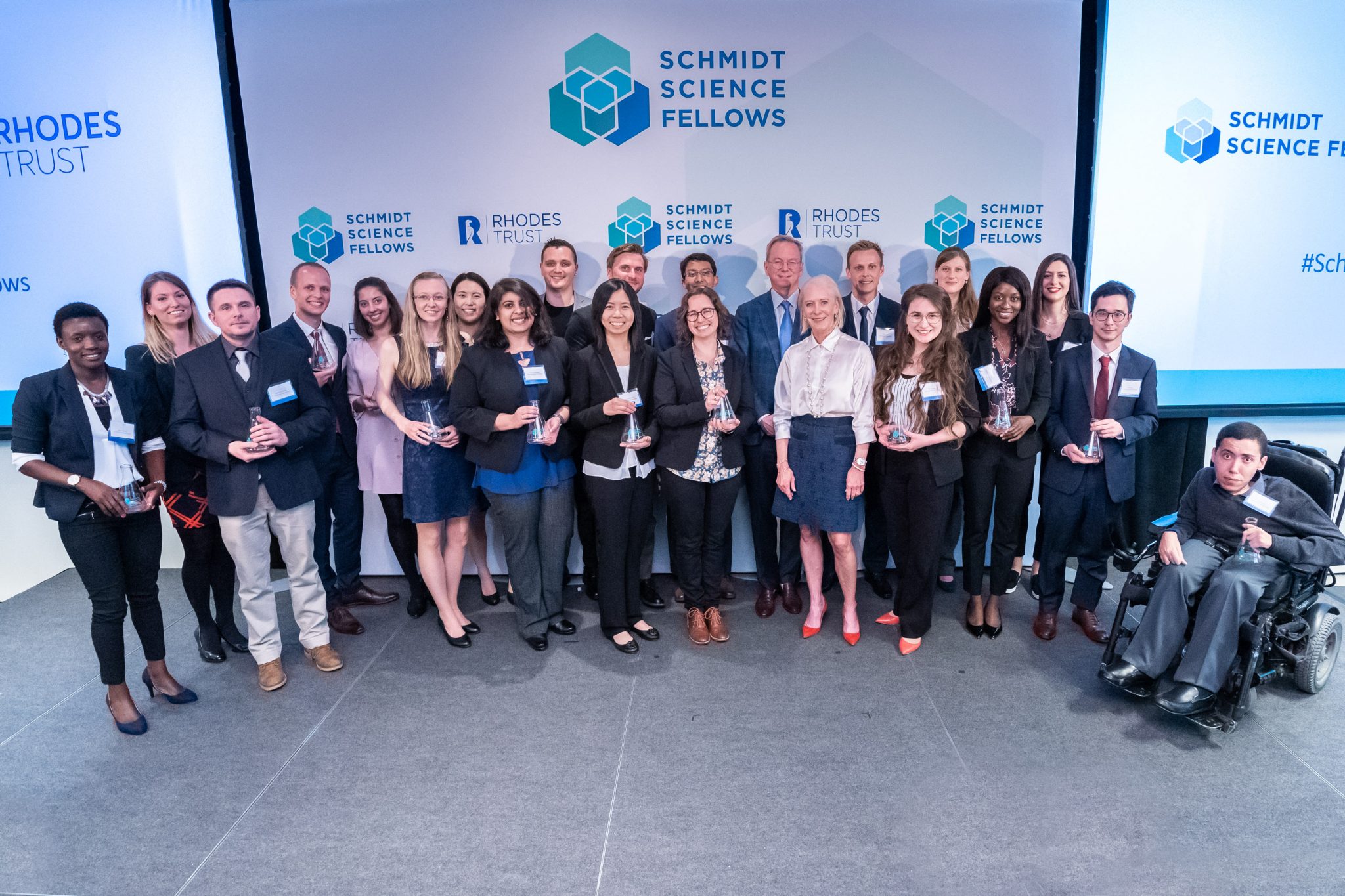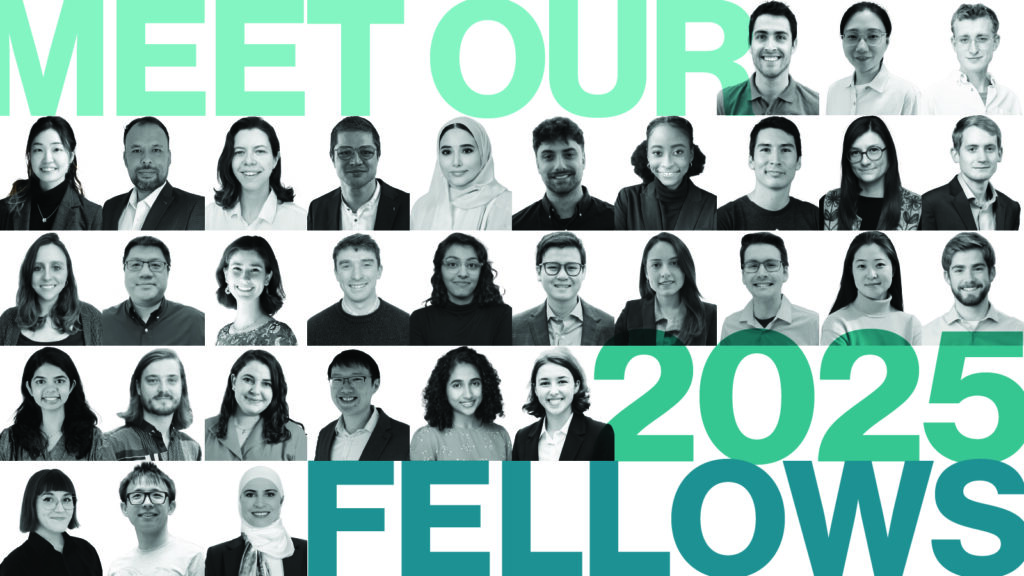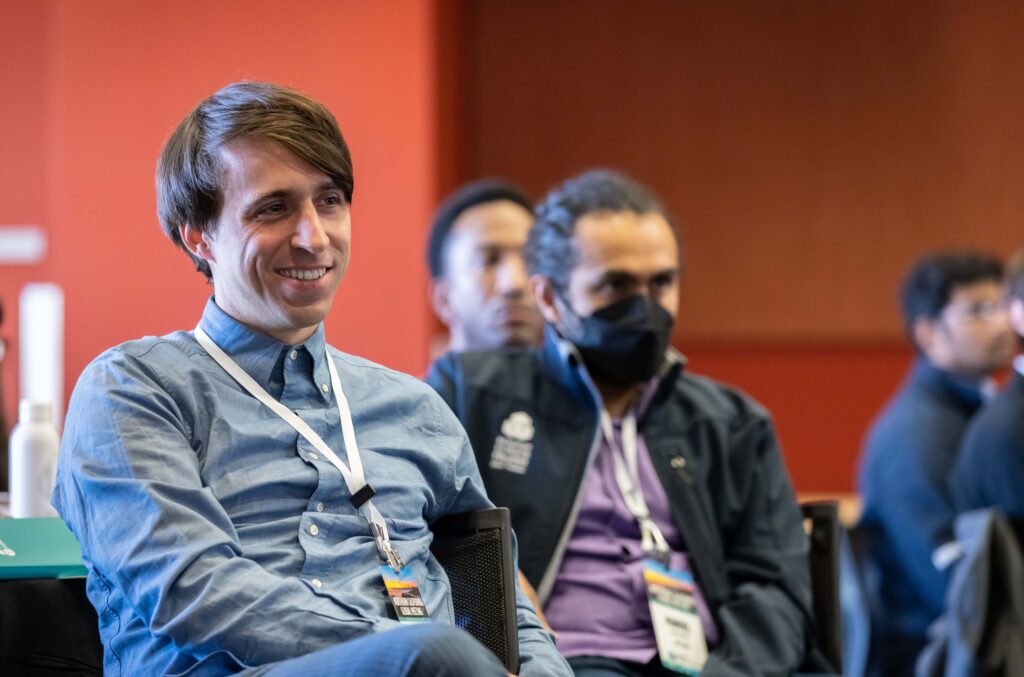Introduction of 20 Fellows Kicks off Second Year of $25 Million Program in Partnership with the Rhodes Trust
Part of a $100 Million Commitment to Drive Scientific Leadership and Interdisciplinary Research
Eric and Wendy Schmidt today announced the 20 members of the 2019 class of Schmidt Science Fellows – a program of Schmidt Futures, in partnership with the Rhodes Trust – at an event in New York City.
This is the second year of this innovative post-doctoral program that aims to develop the next generation of interdisciplinary science leaders to tackle the world’s most significant problems and maximize scientific opportunities for society. The new Fellows are planning to take on global challenges and scientific areas spanning health, the environment, clean energy, computer science, smart materials, and many more.
The 2019 cohort of Fellows is:
- Ina Anreiter, University of Toronto
- Mercy Asiedu, Duke University
- James Briggs, Harvard University
- Kasturi Chakraborty, University of Chicago
- Megan Engel, University of Oxford
- Kaitlyn Gaynor, University of California, Berkeley
- Mina Konakovic Lukovic, EPFL (Lausanne)
- Jyotirmoy Mandal, Columbia University
- Aleksandr Montelli, University of Cambridge
- Gladys Ngetich, University of Oxford
- Paul Ohno, Northwestern University
- Ahmad Omar, California Institute of Technology
- Asja Radja, University of Pennsylvania
- Daniel Raudabaugh, University of Illinois, Urbana-Champaign
- Kadi Liis Saar, University of Cambridge
- Andreas Schlueter, Karlsruhe Institute of Technology
- Rebecca Sherbo, University of British Columbia
- Grisha Spektor, Technion – Israel Institute of Technology
- Saki Takahashi, Princeton University
- Wiriya Thongsomboon, Stanford University
Specific information about the research of each of the new Schmidt Science Fellows can be found below.
This 2019 cohort of Fellows represents 15 countries of origin and joins last year’s inaugural class as part of a growing Schmidt Science Fellows community.
“Our mission at Schmidt Futures is to bet early on talented people who hold the promise of making the world a better place,” said Eric Schmidt, Co-Founder of Schmidt Futures. “That is what the Schmidt Science Fellows program is all about. This new class of Fellows represent some of the best aspiring minds in science and technology today, and we look forward to helping them harness these gifts for the betterment of society.”
“We are tremendously excited to welcome this new class to the growing community of Schmidt Science Fellows,” said Wendy Schmidt, Co-Founder of Schmidt Futures, President of the Schmidt Family Foundation, and Co-Founder of the Schmidt Ocean Institute. “They are truly exceptional in their insight, intellect, and eagerness to work across scientific disciplines and pursue discovery in unprecedented ways. We cannot wait to see what they will accomplish in the years to come.”
Through an initial commitment of at least $25 million for the first three years, this innovative fellowship is part of a broader $100 million effort by Eric and Wendy Schmidt to promote scientific leadership and interdisciplinary research over the next decade and beyond.
The program, delivered in partnership with the Rhodes Trust, home of the prestigious Rhodes Scholarships, places Fellows in a new, world-leading research environment immediately following the completion of their PhD studies. This placement must represent a disciplinary pivot from a Fellow’s current work to expose them to new ideas and techniques from a different scientific discipline. Each Fellow will receive personalized mentoring from experienced and internationally-accomplished scientists and is awarded a stipend of $100,000 as part of the program.
“We are delighted to welcome 20 emerging science leaders into the Schmidt Science Fellows community,” commented Dr. Megan Wheeler, Executive Director of the Schmidt Science Fellows program. “Throughout their Fellowship year they will engage in a unique interdisciplinary research placement, personalized scientific mentoring, and professional development training with the aim of advancing discovery and helping them to tackle the world’s most pressing problems.”
In addition to the post-doctoral placement, Schmidt Science Fellows attend four Global Meetings as a group during their Fellowship year at international science and innovation clusters. These convenings enable Fellows to engage with new concepts, to visit leading science facilities, and to engage with internationally-renowned thought-leaders from science, business, policy, and society.
The Schmidt Science Fellows program is supported by many leading science, engineering, and technology institutions around the world. In addition to the institutions that host Fellows for their placements, many others are involved through the identification and nomination of candidates and by contributing to Global Meetings.
Additional Information about the 2019 cohort of Schmidt Science Fellows
Ina Anreiter, University of Toronto
Ina is a behavioral geneticist working to understand how genes and environmental factors combine to regulate the expression of genes that guide how individuals behave. She is currently working with fruit flies as a model organism. She is now aiming to pivot into machine learning to develop new methods for studying environmental influences on the regulation of gene expression.
Mercy Asiedu, Duke University
Mercy has spent her PhD developing a new low-cost imaging device for self-screening for cervical cancer. Her work has the potential to shift screening from the clinic to the home, drastically improving accessibility for many women. She is now seeking to develop her machine learning skills and apply them to cancer ultrasound applications. Mercy’s work could lead to better outcomes and increased survival rates in developed and developing nations.
James Briggs, Harvard University
During his PhD, James used big data approaches to systems biology to map the period of early development when the ball of mostly homogenous cells generates a wide range of differentiated cells that go on to make up the body. James hopes to use his time as a Schmidt Science Fellow to build new genetic tools to test how complex molecular changes allow cells to decide between fates as ultimately different cell types.
Kasturi Chakraborty, University of Chicago
Kasturi has developed new chemical probes that have been used to investigate how organelles work at a scale below the single cell and how organelle composition affects cell physiology. Now, as a Schmidt Science Fellow, she hopes to change scale to directly visualize microbe interactions in the gut. This will enable her to understand how changes in microbe populations affect a person’s overall health.
Megan Engel, University of Oxford
Megan’s research explores biological self-assembly, the process by which proteins and nucleic acids can build themselves from 1D strands of building blocks into functional 3D shapes. She currently collaborates with experimental biologists to combine computational and statistical approaches to better understand natural processes and inform potential synthetic applications and works on the detailed measurement of the forces acting in DNA and modeling of those forces. As a Schmidt Science Fellow, Megan aims to gain expertise in machine learning techniques to build algorithms that can map the self-assembly process with unprecedented accuracy.
Kaitlyn Gaynor, University of California, Berkeley
Kaitlyn is a behavioral ecologist who has worked to understand the roles and impacts that people have on ecological systems. She has worked in the US and Africa to explore how humans have impacted large animal behavior and distribution. As a Schmidt Science Fellow, Kaitlyn will pivot into data science, where she aims to synthesize a wide range of environmental data to understand global biodiversity trends and their human and environmental drivers.
Mina Konakovic Lukovic, EPFL (Lausanne)
Mina currently works on computational tools for the design and fabrication of complex, smart materials with strict properties and performance. The materials Mina has helped to develop have a variety of potential applications, from medical implants to architecture and space engineering. She is now aiming to work in machine learning to apply this to materials development, with plans to improve medical and robotics applications.
Jyotirmoy Mandal, Columbia University
Jyotirmoy designs surfaces that selectively reflect, transmit, absorb or radiate light depending on their color. By controlling solar and thermal radiation, such surfaces can passively cool buildings, harvest sunlight for heating applications, and achieve thermal camouflage. He now aims to study the fundamentals of optical design, and combine that knowledge with his current expertise to create low-cost optical components for next-generation cameras and imaging systems.
Alexsandr Montelli, University of Cambridge
Alexsandr has worked extensively to observe and measure ice sheets in the Arctic and Antarctica to reconstruct historic polar ice sheets and oceans. This work is crucial to understand ice sheet behavior and predict how they will respond to climate change. Alexsandr aims to use his time as a Schmidt Science Fellow to pivot from observational science to computer modeling, working to create ice sheet and climate simulations.
Gladys Ngetich, University of Oxford
Gladys is an aerospace engineer working on new technology to improve cooling in jet engines. Her work could help develop more efficient and less environmentally damaging aircraft engines. As a Schmidt Science Fellow, Gladys will move into the application of space science technologies, such as satellite imaging and sensing, to support sustainable development goals.
Paul Ohno, Northwestern University
During his PhD, Paul used lasers to investigate the molecular structure at physical interfaces between water and other substances, like minerals or cell membranes. His science has helped us to better understand and control processes such as pollutant transfer in watercourses or cellular signaling. Now, as a Schmidt Science Fellow, Paul will apply his expertise in lasers to directly determine climate-relevant properties of atmospheric aerosol particles suspended in air.
Ahmad Omar, California Institute of Technology
Ahmad works on the fundamental properties of hydrogels. The unique properties of hydrogels make them promising materials for a number of medical applications, including drug delivery. As a Schmidt Science Fellow, Ahmad will pivot to explore the fundamental science of non-equilibrium in cells to understand the biophysical origins of diseases associated with protein aggregation, such as ALS, Alzheimer’s and Huntington’s disease.
Asja Radja, University of Pennsylvania
Asja has worked on the surface pattern formation of pollen grains using statistics, computation, and imaging techniques. Pollen grains have one of the most complex surface patterns of any cell. Her work seeks to understand how these patterns form and what the functional implications could be. She now aims to move into quantitative approaches to describe the growth and changes in the shapes we see in living organisms. Ultimately, Asja hopes to understand the underlying principles that govern the shapes we see in the natural world around us.
Daniel Raudabaugh, University of Illinois, Urbana-Champaign
Daniel’s research is focused on investigating the fungi that live in the submerged detritus at the bottom of bogs and streams. His work is among the first in-depth analyses of how these fungal communities differ and are distributed. These findings have resulted in better understanding of major impacts on important species. Daniel is now aiming to gain skills in toxicology and ecological toxicology to better understand the sources and effects of pollutants in freshwater systems and ways to mitigate toxic effects.
Kadi Liis Saar, University of Cambridge
Kadi studies proteins, the molecules that are central to virtually all processes in our bodies. She is currently working on devising new methods for probing protein folding and aggregation in the context of neurodegeneration. As a Schmidt Science Fellow, she will make use of new techniques, similar to those used by the computer chip and microprocessor industry, to develop a platform for high-throughput characterization of proteomic fingerprints of individual cells, opening up the possibility of identifying previously unknown targets and disease biomarkers. This technology could have a transformative effect on human health-related studies.
Andreas Schlueter, Karlsruhe Institute of Technology
Andreas works on the impact of rainfall on agriculture. His PhD explored fundamental research on the effects of different types of atmospheric waves on rainfall variability over Africa. He showed how these waves create dry and wet periods on timescales of days to weeks and demonstrated their potential for predicting rainfall. As a Schmidt Science Fellow, Andreas plans to develop an innovative crop yield model for Africa, using real-time satellite observations and weather forecasts combined with machine learning techniques.
Rebecca Sherbo, University of British Columbia
Rebecca’s research is focused on finding cleaner ways to perform common chemical transformations by using renewable electricity. She uses a specially-designed reactor and metallic films to perform hydrogenation reactions, common in the food, petrochemical, and pharmaceutical industries, with electricity and water rather than with pressurized hydrogen gas. As a Schmidt Science Fellow, Rebecca will work on new ways to use microbes and renewable electricity to convert CO2 into biofuels. This work will enable us to efficiently store spare renewable electricity and consume waste CO2.
Grisha Spektor, Technion Institute
Grisha works on science at a nano-scale, investigating the interactions between light, matter, and surface waves. His work has implications for manipulating particles and new detector technologies. Grisha aims to work with micro-frequency combs, with the aim of shrinking the most precise instruments science has developed to a chip-scale device. He will explore the limits of these devices to produce extremely sensitive, miniature sensors that could be used in seismology or ultrasound.
Saki Takahashi, Princeton University
Saki works to understand the spread of infectious diseases. In her PhD, she has investigated the geographical spread of measles in Africa and patterns of hand, foot, and mouth disease in Asia. As a Schmidt Science Fellow, Saki aims to combine molecular techniques with big data computing to explore complex human diseases such as malaria. She is especially interested in finding out how a person’s previous exposure to a disease shapes their future immunity.
Wiriya Thongsomboon, Stanford University
Wiriya studies biofilms, the communities of bacteria that combine together within a slimy matrix. During her PhD, she discovered a new, naturally modified cellulose in biofilms of E.coli, with implications for the treatment of urinary tract infections. Wiriya now wants to pivot to work with beneficial bacteria and to exploit tools from bioinformatics, metabolomics, and microbial engineering. She will explore the potential of soil microbes for degrading plastics, optimizing plant productivity, and producing value-added chemicals from agricultural products or waste.
About Schmidt Science Fellows
The Schmidt Science Fellows program, in partnership with the Rhodes Trust, aims to develop the next generation of science leaders to transcend disciplines, advance discovery, and solve the world’s most pressing problems. The program provides Fellows with the skills and perspective to harness and accelerate their exceptional scientific talents and opportunities to engage with diverse thinking in science, politics, society, and business to catalyze new ideas and connections.
Schmidt Science Fellows was launched in 2017 by Eric and Wendy Schmidt and is an initiative of Schmidt Futures, delivered in partnership with the Rhodes Trust. The program has an initial commitment of at least $25 million for the first three years and is the beginning of a broader $100 million effort by Eric and Wendy Schmidt to promote scientific leadership and interdisciplinary research over the next decade and beyond.
www.schmidtsciencefellows.org
@SchmidtFellows
About Schmidt Futures
Schmidt Futures is a philanthropic initiative, founded by Eric and Wendy Schmidt, that bets early on people who will make our world better — helping people to achieve more for others by applying advanced science and technology thoughtfully and by working together across fields. Learn more at www.schmidtfutures.com
About the Rhodes Trust
The Rhodes Trust, based at the University of Oxford, brings together and develops exceptional people from all over the world, and in all fields of study, who are impatient with the way things are and have the courage to act.
The Rhodes Scholarships are postgraduate awards providing transformative educational opportunities. Established in 1903, they are the oldest and perhaps the most prestigious international graduate scholarship programme in the world. Nearly 8,000 Rhodes Scholars have gone on to serve at the forefront of government, education, the arts, NGOs, commerce, research and other sectors. They are well known advocates for expanded social justice, and have advanced the frontiers of science and medicine.
www.rhodeshouse.ox.ac.uk
For Media Inquiries:
Meghan Addessi/Hiltzik Strategies
maddessi@hstrategies.com
212-776-1163
Matt Goode, Director of External Affairs and Fellowship Support
Schmidt Science Fellows
mgoode@schmidtsciencefellows.org
+44 7766 423 372



